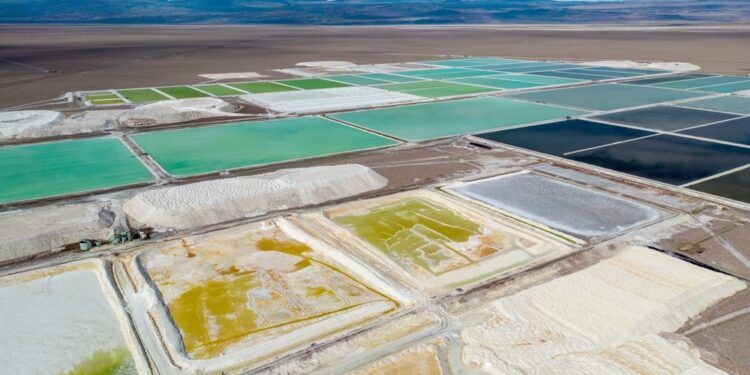The Lithium Triangle is an area between Argentina, Bolivia, and Chile, encompassing close to 60% of the worldﻗs lithium resources.
With around 45 million tonnes lying underneath the vast salt flats between the three countries, it is shocking that the Triangle struggles to extract lithium. Lithium-ion batteries are crucial for the development of electric vehicles, especially with US President Biden announcing that he wants half (around eight million) of all cars sold in the US to be electric by 2030.
Lithium water torture
Lithium requires vast amounts of water to extract, approximately 500,000 gallons of water per ton of lithium extracted, posing serious environmental concerns given that the Lithium Triangle is one of the driest places on earth.
While Chile is the second largest producer of lithium in the world, Argentina and Bolivia have historically struggled to extract significant quantities.ﺡ With production needing to increase by nine times to meet net-zero targets, the countries must find an optimal economic model to ramp up extraction.
Chile
Chile is the biggest producer of lithium in South America, which is expected given extraction began in 1984. Before 2023, lithium was only extracted through two companies: SQM and Albermale. These companies have long felt the ire of the Chilean public for a couple of reasonsﻗaside from the fact that SQMﻗs principal stockholder and Chileﻗs ﻗLithium Kingﻗ is the son of former dictator Augusto Pinochet.
Access the most comprehensive Company Profiles
on the market, powered by GlobalData. Save hours of research. Gain competitive edge.
View profiles in store
Company Profile ﻗ free
sample
Thank you!
Your download email will arrive shortly
We are confident about the
unique
quality of our Company Profiles. However, we want you to make the most
beneficial
decision for your business, so we offer a free sample that you can download by
submitting the below form
By GlobalData
Country *
UK
USA
Afghanistan
ﺣ
land Islands
Albania
Algeria
American Samoa
Andorra
Angola
Anguilla
Antarctica
Antigua and Barbuda
Argentina
Armenia
Aruba
Australia
Austria
Azerbaijan
Bahamas
Bahrain
Bangladesh
Barbados
Belarus
Belgium
Belize
Benin
Bermuda
Bhutan
Bolivia
Bonaire, Sint
Eustatius
and
Saba
Bosnia and Herzegovina
Botswana
Bouvet Island
Brazil
British Indian Ocean
Territory
Brunei Darussalam
Bulgaria
Burkina Faso
Burundi
Cambodia
Cameroon
Canada
Cape Verde
Cayman Islands
Central African Republic
Chad
Chile
China
Christmas Island
Cocos Islands
Colombia
Comoros
Congo
Democratic Republic
of
the Congo
Cook Islands
Costa Rica
Cﺣﺑte d”Ivoire
Croatia
Cuba
Curaﺣ۶ao
Cyprus
Czech Republic
Denmark
Djibouti
Dominica
Dominican Republic
Ecuador
Egypt
El Salvador
Equatorial Guinea
Eritrea
Estonia
Ethiopia
Falkland Islands
Faroe Islands
Fiji
Finland
France
French Guiana
French Polynesia
French Southern
Territories
Gabon
Gambia
Georgia
Germany
Ghana
Gibraltar
Greece
Greenland
Grenada
Guadeloupe
Guam
Guatemala
Guernsey
Guinea
Guinea-Bissau
Guyana
Haiti
Heard Island and
McDonald
Islands
Holy See
Honduras
Hong Kong
Hungary
Iceland
India
Indonesia
Iran
Iraq
Ireland
Isle of Man
Israel
Italy
Jamaica
Japan
Jersey
Jordan
Kazakhstan
Kenya
Kiribati
North Korea
South Korea
Kuwait
Kyrgyzstan
Lao
Latvia
Lebanon
Lesotho
Liberia
Libyan Arab Jamahiriya
Liechtenstein
Lithuania
Luxembourg
Macao
Macedonia,
The
Former
Yugoslav Republic of
Madagascar
Malawi
Malaysia
Maldives
Mali
Malta
Marshall Islands
Martinique
Mauritania
Mauritius
Mayotte
Mexico
Micronesia
Moldova
Monaco
Mongolia
Montenegro
Montserrat
Morocco
Mozambique
Myanmar
Namibia
Nauru
Nepal
Netherlands
New Caledonia
New Zealand
Nicaragua
Niger
Nigeria
Niue
Norfolk Island
Northern Mariana Islands
Norway
Oman
Pakistan
Palau
Palestinian Territory
Panama
Papua New Guinea
Paraguay
Peru
Philippines
Pitcairn
Poland
Portugal
Puerto Rico
Qatar
Rﺣ۸union
Romania
Russian Federation
Rwanda
Saint
Helena,
Ascension and Tristan da Cunha
Saint Kitts and Nevis
Saint Lucia
Saint Pierre and Miquelon
Saint Vincent and
The
Grenadines
Samoa
San Marino
Sao Tome and Principe
Saudi Arabia
Senegal
Serbia
Seychelles
Sierra Leone
Singapore
Slovakia
Slovenia
Solomon Islands
Somalia
South Africa
South
Georgia
and The South
Sandwich Islands
Spain
Sri Lanka
Sudan
Suriname
Svalbard and Jan Mayen
Swaziland
Sweden
Switzerland
Syrian Arab Republic
Taiwan
Tajikistan
Tanzania
Thailand
Timor-Leste
Togo
Tokelau
Tonga
Trinidad and Tobago
Tunisia
Turkey
Turkmenistan
Turks and Caicos Islands
Tuvalu
Uganda
Ukraine
United Arab Emirates
US Minor Outlying Islands
Uruguay
Uzbekistan
Vanuatu
Venezuela
Vietnam
British Virgin Islands
US Virgin Islands
Wallis and Futuna
Western Sahara
Yemen
Zambia
Zimbabwe
Kosovo
Industry *
Academia & Education
Aerospace, Defense &
Security
Agriculture
Asset Management
Automotive
Banking & Payments
Chemicals
Construction
Consumer
Foodservice
Government, trade bodies
and NGOs
Health & Fitness
Hospitals & Healthcare
HR, Staffing &
Recruitment
Insurance
Investment Banking
Legal Services
Management Consulting
Marketing & Advertising
Media & Publishing
Medical Devices
Mining
Oil & Gas
Packaging
Pharmaceuticals
Power & Utilities
Private Equity
Real Estate
Retail
Sport
Technology
Telecom
Transportation &
Logistics
Travel, Tourism &
Hospitality
Venture Capital
Tick here to opt out of curated industry news, reports, and event updates from Verdict.
Submit and
download
Visit our Privacy Policy for more information about our services, how we may use, process and share your personal data, including information of your rights in respect of your personal data and how you can unsubscribe from future marketing communications. Our services are intended for corporate subscribers and you warrant that the email address submitted is your corporate email address.
Firstly, SQM and Albermale are private companies that share profits with shareholders rather than Chileans. Secondly, there has been significant environmental damage in the salt planes where lithium extraction took place. Lower water levels have resulted in the indigenous flamingo population dropping by 10% since 1983, as well as locals struggling to farm and mine. The unrest caused by these factors partially forced Gabriel Boric, the president of Chile, to all-but nationalise the lithium industry last year.
Following this announcement, stock prices of Albermale and SQM fell by 11% and 19%, respectively, despite SQM being granted mining rights in the Atacama Desert until 2060. Boric has promised to honor prior agreements with corporations, with the only viable path for future investment being through partnerships with the government. Given the lack of parliamentary finalisation and long-term outstanding contracts, it will be a while until we see the effects of nationalisation on the Chilean public and economy.
Bolivia
Bolivia is the laggard of the group yet has high aims, with President Luis Acre wanting to make lithium-ion batteries locally by 2025. Despite investing hundreds of millions of dollars into the industry, lithium extraction remains poor.
Lithium production requires specialist equipment that Bolivia cannot source locally, resulting in rushed openings of extraction plants using untested equipment. Infrastructure in the region is limited and the altitude of the salt flats further this problem. Simultaneously, according to a US geological survey, large amounts of Bolivian lithium contain magnesium, making the reserves commercially unviable. ﺡ
Political instability has been rife in Bolivia. There have been more than 190 coups since the formation of the state in 1825, the most recent of which occurred in June 2024, furthering an already tense relationship with the Bolivian people.
Production is run by YLB, Boliviaﻗs national lithium extraction firm, and is designated as a strategic resource. This has resulted in a suboptimal foreign investment climate due to Bolivia favouring a slow but sovereign entrance to the global market.
Despite turning away Western investors, last year Bolivia signed deals with Chinese and Russian consortiums to aid investment in the salt flats. Bolivia sits on the largest reserves of lithium in the world but is unable to exploit its position due to an unfavourable investment climate and poor infrastructure.
Argentina
The most promising nation of the three to investors is Argentina, which increased its lithium production by 79% from 2023 to 2024 according to GlobalData. The recent election of Javier Milei has proven promising to businesses, as his decentralised approach has attracted investors from across the world. GlobalData forecasts that Argentina will increase its lithium production to 500,000 tons by 2030, becoming the second-largest producer of lithium in the world by 2026. Milei provides lax regulation for potential businesses, with his openness aiming to increase the amount of salt flat facilities from the current two.
More than 30 global mining conglomerates have encroached on the region, often being rewarded with contracts without consulting or notifying the Argentinian population. Transparency is a key issue in Argentina with sweeping constitutional reforms to the Jujuy province being ushered overnight behind closed doors.
These reforms modified the right to indigenous land and to demonstrate. With rising amounts of Chinese workers replacing Argentinians, and ever-present inflationary pressures, Argentina may not be as stable as investors believe.
The difference in success between the three countries lies in economics and geography. Pinochet recognised the potential of lithium extraction early on, redistributing his economic resources to maximise output regardless of the human and environmental costs. Chile also designated lithium a strategic mineral 12 years ago, pushing the nation up to the second biggest producer of lithium in the world.
Unfavourable geographic and investment climates in Argentina prevented significant industrial development, with Bolivia struggling to mobilise its large, albeit quite poor, workforce to extract the mineral. Argentina has the largest growth, Chile has a head start yet is flatlining, and Bolivia has the most untapped resources yet cannot produce.
OLEC?
Last year, Mexican president Andres Obrador suggested that an OPEC (Organisation of the Petroleum Exporting Countries) type organisation for lithium would be ideal to promote growth in the area.
With the demand for lithium increasing, a Lithium Triangle organisation with Brazil and Mexico would control 65% of the worldﻗs lithium and 35% of current production.
However; this is unlikely as lithium isnﻗt like oil; it isnﻗt traded like a specialist product or major commodity, making it harder to standardise the price.
Higher lithium prices will make it viable for other countries to develop lithium deposits that were previously too expensive. Chileﻗs nationalisation and Boliviaﻗs perpetual struggles to mobilise its reserves, combined with Argentinaﻗs political and economic instability, show that the Lithium Triangle is a region rife with issues yet an area that will determine the future of humanity.
These countries must find stability and a way to efficiently extract lithium if we are to meet climate targets.
Source link : https://www.verdict.co.uk/lithium-triangle-chile-argentina-bolivia/
Author :
Publish date : 2024-07-12 09:55:15
Copyright for syndicated content belongs to the linked Source.












